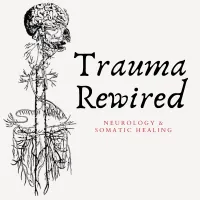View Transcript
Episode Description
What if grief isn't something to "get over," but a biological process that reshapes your sense of self, capacity, and connection?
In this episode, co-hosts Elisabeth Kristof and Jennifer Wallace are joined by Piper Rose—founder of Shadowplay Coaching and Director of Operations and Continuing Education at NSI—to explore grief through the lens of neuroscience and the body.
Together, they examine how the brain and body respond to major transitions, why sensations like heaviness or ache are part of adaptive prediction, and how practices that mobilize breath, voice, and thoracic movement can support your physiology's innate ability to heal.
You'll hear why grief looks different for everyone—from action-oriented logistics to relational sharing—and how both are valid paths. The conversation moves through the concept of a minimum effective dose for grief work, the overlap between pain and emotional circuits, the role of co-regulation, and why meaning-making often comes later in the process.
Anger and sacred rage also get their space here—alongside pathways back to nourishment.
Whether you're navigating loss, identity transitions, or the transformations that come with growth, this episode offers grounded language, body-based tools, and community-centered practices to help you fall apart, be held, and reform with greater capacity.
Timestamps:
-
00:00 — Grief as a physiological process, not a problem to fix
-
06:30 — How the brain maps grief: interoception, prediction, pain circuits
-
14:10 — Two grief styles: action orientation and expressive processing
-
21:40 — Minimum-effective-dose grief practice and daily resourcing
-
29:00 — Anger inside grief, sacred rage, and safe expression
-
36:20 — Belonging, co-regulation, and being held by people or the earth
-
44:15 — Timing of meaning-making and avoiding premature silver linings
-
51:00 — Practical ways to start: personal, relational, and community supports
Key Takeaways:
-
Grief is an adaptive social-threat response that updates your body's internal maps.
-
The same networks tied to physical pain can interpret loss, which is why grief can ache.
-
People grieve differently. Action and expression are both valid pathways.
-
Small, repeatable practices help build capacity without overwhelm.
-
Co-regulation and clear support reduce isolation and soften protective patterns.
Resources Mentioned:
-
NeuroSomatic Intelligence (NSI) Foundations Bundle — Three on-demand workshops to integrate applied neuroscience and somatics into your work: https://neurosomaticintelligence.com/foundations
-
BrainBased.com — Community using applied neurology and somatics: https://brainbased.com
-
Shadowplay Coaching (Piper Rose) — Relationship and grief-support coaching.
If this episode supported you, subscribe and leave a review so others can find the show. Share it with someone who could use compassionate, science-informed language for grief.
If you're a coach, therapist, or practitioner ready to integrate applied neuroscience and somatics into your work, start with the NSI Foundations Bundle at NeurosomaticIntelligence.com/Foundations.
Disclaimer:
Trauma Rewired podcast is intended to educate and inform but does not constitute medical, psychological or other professional advice or services. Always consult a qualified medical professional about your specific circumstances before making any decisions based on what you hear. We share our experiences, explore trauma, physical reactions, mental health and disease. If you become distressed by our content, please stop listening and seek professional support when needed. Do not continue to listen if the conversations are having a negative impact on your health and well-being. If you or someone you know is struggling with their
mental health, or in mental health crisis and you are in the United States you can 988 Suicide and Crisis Lifeline.
If someone's life is in danger, immediately call 911.
We do our best to stay current in research, but older episodes are always available. We don't warrant or guarantee that this podcast contains complete, accurate or up-to-date information. It's very important to talk to a medical professional about your individual needs, as we aren't responsible for any actions you take based on the information you hear in this podcast.
We invite guests onto the podcast. Please note that we don't verify the accuracy of their statements. Our organization does not endorse third-party content and the views of our guests do not necessarily represent the views of our organization. We talk about general neuro-science and nervous system health, but you are unique. These are conversations for a wide audience. They are general recommendations and you are always advised to seek personal care for your unique outputs, trauma and needs.
We are not doctors or licensed medical professionals. We are certified neuro-somatic practitioners and nervous system health/embodiment coaches. We are not your doctor or medical professional and do not know you and your unique nervous system. This podcast is not a replacement for working with a professional. The BrainBased.com site and RewireTrial.com is a membership site for general nervous system health, somatic processing and stress processing. It is not a substitute for medical care or the appropriate solution for anyone in mental health crisis.
Any examples mentioned in this podcast are for illustration purposes only. If they are based on real events, names have been changed to protect the identities of those involved.
We've done our best to ensure our podcast respects the intellectual property rights of others, however if you have an issue with our content, please let us know by emailing us at traumarewired@gmail.com.
All rights in our content are reserved.
